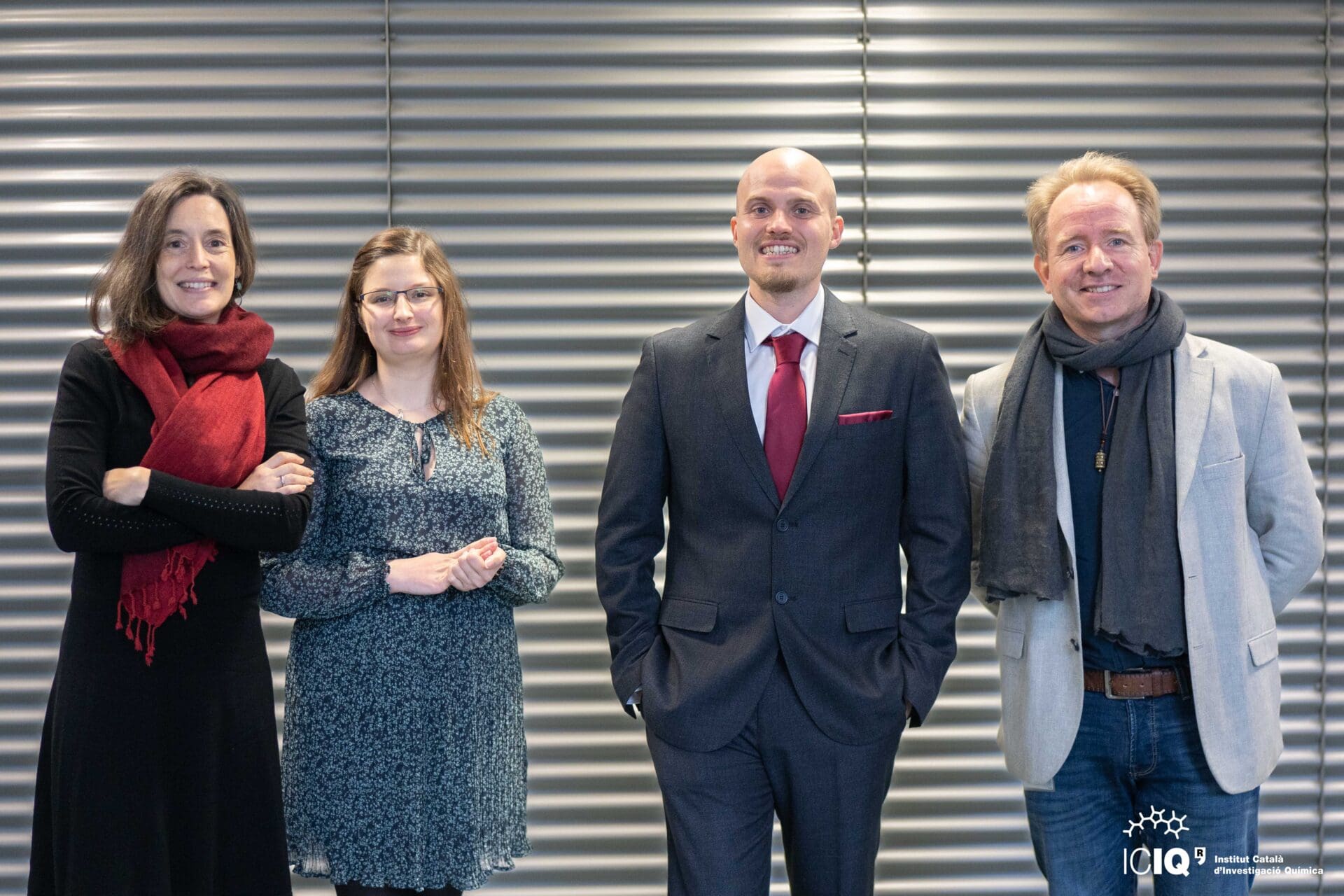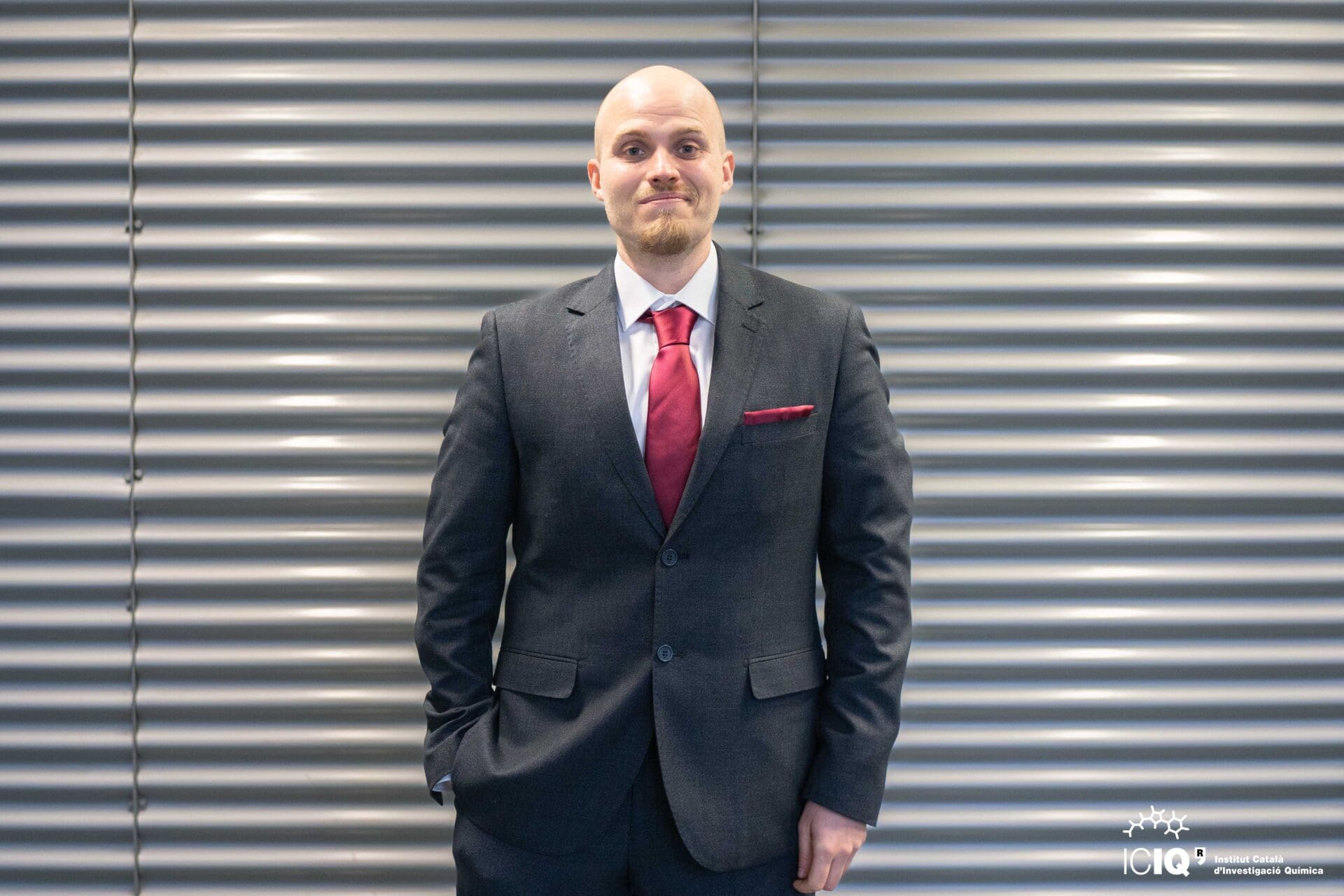Enhorabona, Dr. Sabadell!
Albert Sabadell, PhD student under the supervision of Prof. Núria López (ICIQ), has defended his PhD thesis entitled “Interpretable models to explain Heterogeneous Catalysis” (assigned to the Inorganic and Physical Chemistry Department of the Universitat Rovira i Virgili) publicly on December 12th.
The members of the evaluation committee were Prof. Dr. Jean-Didier Maréchal (Universitat Autònoma de Barcelona), Dr. Marta Sales (Universitat Rovira i Virgili) and Dr. Kamilla Maria Kazmierczak (Université Lyon, France).

Dr. Sabadell with the members of the evaluation committee
Dr. Sabadell is from Cerdanyola del Vallès. He got his double bachelor on physics and chemistry in the Universitat Autònoma de Barcelona (UAB). His hobbies are sports (mainly calisthenics and climbing) and spend time with his friends, family, and girlfriend.
His Ph. D. was funded by TotalEnergies (from the second to the fourth year). This company will also fund his postdoc here at ICIQ.
Why did you become a scientist?
I wanted to study philosophy. However, my mother convinced me in the following conversation:
- Inma (mother): “Ok, Albert, so you want to study philosophy. Name three philosophers”
- Albert: “Descartes, Hume, and Plato”
- Inma: “What they three have in common?”
- Albert: (reflexive silence)
- Inma: “Let me answer for you: they three come from economically accommodated families. You need a grant to go to the university. Go, do some scientific stuff, and get a good job.”
So, I become a scientist because I wanted to optimize my probabilities to get a job and not to starve.
What is your thesis about?
My thesis is about generating models (that is: mathematical descriptions of reality) to explain and predict experimental observations, such as conversion, selectivity, or yield. Those models might be used to optimize reactions in terms of material, energetical, and financial resources.
What triggered your interest for the subject of your thesis?
I am good at math, and the entire degree of physics is about generating models. Thus, modeling reactors and chemical systems was ideal for me.
What applications can your thesis have in the future?
The work carried out in collaboration with TotalEnergies might be used in future industrial procedures optimization.
The thing that I like most about my thesis is….
The people I met.
From the lessons learnt (or skills developed) at ICIQ, which one do you value the most?
Statistics and Python coding.
What ICIQ moment you´ll never forget?
The “calçotadas”.
What will you miss the most from ICIQ?
The friends I made here.
What do you wish you had known at the beginning of your PhD?
I would like to code as I do in the present moment, to write in a scientific manner, and to perform figures.
Who/What has been your biggest influence/motivation?
Be able to pay the rent is my main motivation.
Where are you going next? What will you do there?
I will continue two more years at the ICIQ as a postdoc working in collaboration with TotalEnergies.
Chemistry/Science is fun because…
… otherwise no one would do it. Goldstein wrote in his book “States of the Matter”: “Ludwig Boltzmann, who spent much of his life studying statistical mechanics, died in 1906, by his own hand. Paul Ehrenfest, carrying on the work, died similarly in 1933. Now it is our turn to study statistical mechanics. Perhaps it will be wise to approach the subject cautiously…”
What is your favourite molecule?
I believe that all those molecules with more than three carbons are a lie. So, Hydrogen.
If you were a piece of lab equipment, what would you be?
The fridge.
Tell us something about you that people might not know…
I am mostly transparent, people who knows me can relate. So, I have no secrets.

Related news

Let's create a brighter future
Join our team to work with renowned researchers, tackle groundbreaking
projects and contribute to meaningful scientific advancements






 20-12-2024
20-12-2024 


















